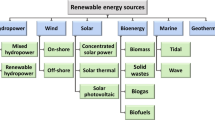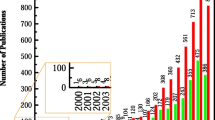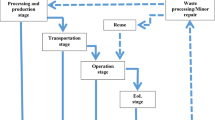Abstract
The simultaneous escalation in energy consumption and greenhouse gases in the environment drives power generation to pursue a more sustainable path. Solar photovoltaic is one of the technologies identified as a possible source of clean, green, and affordable energy in the future. The vast land area occupied by solar photovoltaics to generate electricity suggests that large photovoltaic facilities be built on the water surface, serving the dual purpose of saving land, increasing efficiency and power output. Despite the remarkable geophysical conditions of India, the evaluation of floating solar photovoltaic power plants revealed little involvement in this technology. This research aims to offer a comprehensive technical and sustainable goal-based analysis to provide an efficient hybrid hydel-floating solar photovoltaic system. In this paper, an assessment of a 96 megawatt power plant is done to show the economic and ecological benefits of a floating solar photovoltaic system. A comparison of land-based photovoltaic, floating solar photovoltaic, and hybrid hydel-floating solar photovoltaic is done to check the cost-efficiency and sustainability. The result indicates that the floating solar photovoltaics system produces 81.39 gigawatt-hour excess generation with 2.4% more energy yield compared to the land-based photovoltaic system. The total water saved is 69.4 mcm. The equivalent carbon reduction is 123,454.53 tons of CO2. The levelized cost of energy generation is 3.23 $/W, which is 2.3% less than the current price of electricity. The floating solar photovoltaic help in achieving sustainable development goals along with the protection of the ecological system.
Graphical abstract
























Similar content being viewed by others
Data availability
Not applicable.
Code availability
Not applicable.
References
Aayog NITI (2022) Government of India energy dashboards—supply & deficit. https://www.niti.gov.in/edm/#elecSupply. Accessed 20 Apr 2022
Abdeen O, Mordjaoui M, Haddad S, Asma B (2019) The impacts of the geographical location on the performance of PV system-Skikda in Algeria and Atbara in Sudan: case study. Int J Renew Energy Technol 10:328–347. https://doi.org/10.1504/IJRET.2019.10023910
Abeykoon AMKL, Aponsu GMLP, Gunathilaka HMBI, Nadeera HAV (2018) Effect of temperature on the photovoltaic characteristics of polycrystalline silicon solar cells at hambantota solar power plant 4:270–275
Acharya M, Devraj S (2019) Floating solar photovoltaic (FSPV): a third pillar to solar PV sector? TERI discuss. New Delhi Energy Resource Institute. https://www.teriin.org/sites/default/files/2020-02/Floating%20Solar%20Photovoltaic%20%28FSPV%29%20A%20Third%20Pillar%20to%20Solar%20PV%20Sector.pdf
Agrawal KK, Jha SK, Mittal RK, Vashishtha S (2022) Assessment of floating solar PV (FSPV) potential and water conservation: case study on Rajghat Dam in Uttar Pradesh, India. Energy Sustain Dev 66:287–295. https://doi.org/10.1016/j.esd.2021.12.007
Akinsola GD, Awosusi AA, Kirikkaleli D, Umarbeyli S, Adeshola I, Adebayo TS (2022) Ecological footprint, public-private partnership investment in energy, and financial development in Brazil: a gradual shift causality approach. Environ Sci Pollut Res 29(7):10077–10090. https://doi.org/10.1007/s11356-021-15791-5
Al Garni HZ, Awasthi A (2018) Solar PV power plants site selection: a review. In: Advances in renewable energies and power technologies. Elsevier vol 1, pp. 57–75. https://doi.org/10.1016/B978-0-12-812959-3.00002-2
Alnaser NW, al OthmanDakhel MJAA et al (2018) Comparison between performance of man-made and naturally cleaned PV panels in a middle of a desert. Renew Sustain Energy Rev 82:1048–1055. https://doi.org/10.1016/j.rser.2017.09.058
Amelia AR, Irwan YM, Leow WZ et al (2016) Investigation of the effect temperature on photovoltaic (PV) panel output performance. Int J Adv Sci Eng Inf Technol. https://doi.org/10.18517/ijaseit.6.5.938
Babatunde AA, Abbasoglu S, Senol M (2018) Analysis of the impact of dust, tilt angle and orientation on performance of PV plants. Renew Sustain Energy Rev 90:1017–1026. https://doi.org/10.1016/j.rser.2018.03.102
Badri Ahmadi H, Lo HW, Gupta H et al (2022) Analyzing interrelationships among environmental sustainability innovation factors. Clean Technol Environ Policy 24:1191–1207. https://doi.org/10.1007/s10098-021-02086-z
Banik A, Sengupta A (2021) Scope, challenges, opportunities and future goal assessment of floating solar park. In: 2021 innovations in energy management and renewable resources(52042), pp. 1-5. https://doi.org/10.1109/IEMRE52042.2021.9386735
Barbuscia M (2017) Economic viability assessment of floating photovoltaic energy. Work Pap 1:1–1
Belhachat F, Larbes C (2021) PV array reconfiguration techniques for maximum power optimization under partial shading conditions: a review. Sol Energy 230:558–582. https://doi.org/10.1016/j.solener.2021.09.089
Bhawan S, Puram RK (2018) CO2 baseline database for the Indian power sector user guide government of India ministry of power central electricity authority. https://cea.nic.in/wp-content/uploads/baseline/2020/07/user_guide_ver14.pdf. Accessed 22 Apr 2022
Bilgili F, Ozturk I, Kocak E, Kuskaya S, Cingoz A (2022) The nexus between access to electricity and CO2 damage in Asian Countries: the evidence from quantile regression models. Energy Build 256:111761. https://doi.org/10.1016/j.enbuild.2021.111761
Bontempo Scavo F, Tina GM, Gagliano A, Nižetić S (2021) An assessment study of evaporation rate models on a water basin with floating photovoltaic plants. Int J Energy Res 45:167–188. https://doi.org/10.1002/er.5170
Carvalho PCM, Machado LA, Vitoriano CT, Ramírez LMF (2018) Land requirement scenarios of PV plants in Brazil. Renew Energy Power Qual J 1:170–174. https://doi.org/10.24084/repqj16.252
Cazzaniga R, Rosa-Clot M, Rosa-Clot P, Tina GM (2019) Integration of PV floating with hydroelectric power plants. Heliyon. https://doi.org/10.1016/j.heliyon.2019.e01918
CEA Annual report 2020–21. Central electricity authority, Ministry of power, Government of India. https://cea.nic.in/wp-content/uploads/notification/2021/12/CEAAnnualReport_final.pdf
CERC (2011) Performance of solar power plants in India, Central Electricity Regulatory Commission New Delhi. https://cercind.gov.in/2011/Whats-New/PERFORMANCE%20OF%20SOLAR%20POWER%20PLANTS.pdf
CERC (2017) Terms and conditions for tariff determination from renewable energy sources regulations, central electricity regulatory commission New Delhi. https://cercind.gov.in/2017/regulation/Noti131.pdf
Choudhary P, Srivastava RK (2019) Sustainability perspectives- a review for solar photovoltaic trends and growth opportunities. J Clean Prod 227:589–612. https://doi.org/10.1016/j.jclepro.2019.04.107
CII vision document: Jharkhand@2022 A sustainable development vision. http://indiaat75.in/wpcontent/themes/Indiaat75/myassets/pdf/national_and_state_vision_document/Jharkhand.pdf
Díaz-Cuevas P, Camarillo-Naranjo JM, Pérez-Alcántara JP (2018) Relational spatial database and multi-criteria decision methods for selecting optimum locations for photovoltaic power plants in the province of Seville (southern Spain). Clean Techn Environ Policy 20:1889–1902. https://doi.org/10.1007/s10098-018-1587-2
Dörenkämper M, Wahed A, Liu Kumar A et al (2021) The cooling effect of floating PV in two different climate zones: a comparison of field test data from the Netherlands and Singapore. Sol Energy 219:15–23. https://doi.org/10.1016/j.solener.2021.03.051
DVC (2022) Reservoirs overview and salient features of Jharkhand. Damodar valley corporation. https://www.dvc.gov.in/dvcwebsite_new1/dams-barrages/. Accessed 17 Apr 2022
Elboshy B, Alwetaishi M, M. H. Aly R, Zalhaf AS, (2022) A suitability mapping for the PV solar farms in Egypt based on GIS-AHP to optimize multi-criteria feasibility. Ain Shams Eng J. https://doi.org/10.1016/j.asej.2021.10.013
Energy Agency (2021) Review 2021 Assessing the effects of economic recoveries on global energy demand and CO2 emissions in 2021 Global Energy. https://iea.blob.core.windows.net/assets/d0031107-401d-4a2f-a48b-9eed19457335/GlobalEnergyReview2021.pdf
Energy, NITI Aayog (2022). https://www.niti.gov.in/verticals/energy. Accessed 2 May 2022
Feldman D, Anna Ebers N, Robert Margolis D (2019) Q3/Q4 2018 solar industry update. Natl Renew Energy Lab (NREL). https://doi.org/10.2172/1494742
Fereshtehpour M, Javidi Sabbaghian R, Farrokhi A et al (2021) Evaluation of factors governing the use of floating solar system: a study on Iran’s important water infrastructures. Renew Energy 171:1171–1187. https://doi.org/10.1016/j.renene.2020.12.005
Gonzalez Sanchez R, Kougias I, Moner-Girona M et al (2021) Assessment of floating solar photovoltaics potential in existing hydropower reservoirs in Africa. Renew Energy 169:687–699. https://doi.org/10.1016/j.renene.2021.01.041
Gorjian S, Sharon H, Ebadi H, Kant K, Scavo FB, Tina GM (2020) Recent technical advancements, economics and environmental impacts of floating photovoltaic solar energy conversion systems. J Clean Prod. https://doi.org/10.1016/j.jclepro.2020.124285
Goswami A, Sadhu PK (2021a) Degradation analysis and the impacts on feasibility study of floating solar photovoltaic systems. Sustain Energy Grids Netw. https://doi.org/10.1016/j.segan.2020.100425
Goswami A, Sadhu PK (2021b) Adoption of floating solar photovoltaics on waste water management system: a unique nexus of water-energy utilization, low-cost clean energy generation and water conservation. Clean Technol Environ Policy. https://doi.org/10.1007/s10098-021-02077-0
Goswami A, Sadhu P, Goswami U, Sadhu PK (2019) Floating solar power plant for sustainable development: a techno-economic analysis. Environ Prog Sustain Energy. https://doi.org/10.1002/ep.13268
Hafeez H, Kashif Janjua A, Nisar H et al (2022) Techno-economic perspective of a floating solar PV deployment over urban lakes: a case study of NUST lake Islamabad. Sol Energy 231:355–364. https://doi.org/10.1016/j.solener.2021.11.071
IEA (2019), Greenhouse gas emissions from energy data Explorer—analysis. https://www.iea.org/articles/greenhouse-gas-emissions-from-energy-data-explorer. Accessed 4 May 2022
IEA (2021a) India Energy Outlook 2021a. OECD Publishing, Paris. https://doi.org/10.1787/ec2fd78d-en
IEA (2021b) World energy outlook 2021b. IEA, Paris https://www.iea.org/reports/world-energy-outlook-2021b. Accessed 17 Apr 2022
Jamil B, Siddiqui AT, Akhtar N (2016) Estimation of solar radiation and optimum tilt angles for south-facing surfaces in Humid subtropical climatic region of India. Eng Sci Technol Int J 19:1826–1835. https://doi.org/10.1016/j.jestch.2016.10.004
Javed SA, Cudjoe D (2022) A novel grey forecasting of greenhouse gas emissions from four industries of China and India. Sustain Prod Consum 29:777–790. https://doi.org/10.1016/J.SPC.2021.11.017
Jharkhand Power Policy 2018 Draft. Central board of irrigation and power. http://www.cbip.org/policies2019/PD_07_Dec_2018_Policies/Jharkhand/3-Power%20Policy/2%20order%20Jharkhand%20Power%20Policy%202018%20Draft.pdf
Khatri R (2016) Design and assessment of solar PV plant for girls hostel (GARGI) of MNIT university, Jaipur city: a case study. Energy Rep 2:89–98. https://doi.org/10.1016/j.egyr.2016.05.002
Kiesecker J, Baruch-Mordo S, Heiner M et al (2020) Renewable energy and land use in india: a vision to facilitate sustainable development. Sustain (switzerland). https://doi.org/10.3390/su12010281
Knez M, Jereb B, Jadraque Gago E et al (2021) Features influencing policy recommendations for the promotion of zero-emission vehicles in Slovenia, Spain, and Poland. Clean Technol Environ Policy 23:749–764. https://doi.org/10.1007/s10098-020-01909-9
Kumar M, Chandel SS, Kumar A (2020) Performance analysis of a 10 MWp utility scale grid-connected canal-top photovoltaic power plant under Indian climatic conditions. Energy. https://doi.org/10.1016/j.energy.2020.117903
Lakshmanan PK, Singh S, Asta Lakshmi S (2017) The paris agreement on climate change and India. J Clim Change 3:1–10. https://doi.org/10.3233/jcc-170001
Lee CY, Ahn J (2020) Stochastic modeling of the levelized cost of electricity for solar PV. Energies (basel). https://doi.org/10.3390/en13113017
Li X, Hu Z, Zhang Q (2021) Environmental regulation, economic policy uncertainty, and green technology innovation. Clean Technol Environ Policy 23:2975–2988. https://doi.org/10.1007/s10098-021-02219-4
Liu H, Krishna V, LunDöre Leung J et al (2018) Field experience and performance analysis of floating PV technologies in the tropics. Prog Photovolt Res Appl 26:957–967. https://doi.org/10.1002/pip.3039
Liu H, Kumar A, Reindl T (2020) The dawn of floating solar—technology, benefits, and challenges. Lecture notes in civil engineering. Springer 41:373–383. https://doi.org/10.1007/978-981-13-8743-2_21
Maghami MR, Hizam H, Gomes C et al (2016) Power loss due to soiling on solar panel: a review. Renew Sustain Energy Rev 59:1307–1316. https://doi.org/10.1016/j.rser.2016.01.044
Manoj Kumar N, Mallikarjun P (2018) Floatovoltaics: towards improved energy efficiency, land and water management. Int J Civ Eng Technol (IJCIET) 9:1089–1096
Manoj Kumar N, Sudhakar K, Samykano M (2019) Techno-economic analysis of 1 MWp grid connected solar PV plant in Malaysia. Int J Ambient Energy 40:434–443. https://doi.org/10.1080/01430750.2017.1410226
Mao M, Cui L, Zhang Q et al (2020) Classification and summarization of solar photovoltaic MPPT techniques: a review based on traditional and intelligent control strategies. Energy Rep 6:1312–1327. https://doi.org/10.1016/j.egyr.2020.05.013
Merrouni AA, Mezrhab A, Mezrhab A (2016) PV sites suitability analysis in the Eastern region of Morocco. Sustain Energy Technol Assess 18:6–15. https://doi.org/10.1016/j.seta.2016.09.006
MNRE (2021) annual report 2020-21. https://mnre.gov.in/.
Mohanty S, Subudhi B, Ray PK (2016) A new MPPT design using grey Wolf optimization technique for photovoltaic system under partial shading conditions. IEEE Trans Sustain Energy 7:181–188. https://doi.org/10.1109/TSTE.2015.2482120
Nasirov S, Agostini C, Silva C, Caceres G (2018) Renewable energy transition: a market-driven solution for the energy and environmental concerns in Chile. Clean Technol Environ Policy 20:3–12. https://doi.org/10.1007/s10098-017-1434-x
National Electricity Policy (2003), Government of India, Ministry of Power. https://powermin.gov.in/en/content/national-electricity-policy. Accessed 2 May 2022
Nirmal G, Dileep GM (2019) Willingness and acceptance, to pay for the solar-based home system: survey evidence from Kerala. Int J Recent Technol Eng (IJRTE) 8:2018–2025
Okoye CO, Oranekwu-Okoye BC (2018) Economic feasibility of solar PV system for rural electrification in Sub-Sahara Africa. Renew Sustain Energy Rev 82:2537–2547. https://doi.org/10.1016/j.rser.2017.09.054
Olivier JGJ, Peters JAHW (2020) Trends in global CO2 and total greenhouse gas emissions 2019 Report. https://www.pbl.nl/sites/default/files/downloads/pbl-2020-trends-in-global-co2-and-total-greenhouse-gas-emissions-2019-report_4068.pdf
Osmani K, Ramadan M, Lemenand T et al (2021) Optimization of PV array tilt angle for minimum levelized cost of energy. Comput Electr Eng. https://doi.org/10.1016/j.compeleceng.2021.107474
Podder AK, Roy NK, Pota HR (2019) MPPT methods for solar PV systems: a critical review based on tracking nature. IET Renew Power Gener 13:1615–1632. https://doi.org/10.1049/iet-rpg.2018.5946
Pringle AM, Handler RM, Pearce JM (2017) Aquavoltaics: synergies for dual use of water area for solar photovoltaic electricity generation and aquaculture. Renew Sustain Energy Rev 80:572–584. https://doi.org/10.1016/j.rser.2017.05.191
Rauf H, Gull MS, Arshad N (2020) Complementing hydroelectric power with floating solar PV for daytime peak electricity demand. Renew Energy 162:1227–1242. https://doi.org/10.1016/j.renene.2020.08.017
RBI Report (2015) Recent trends in residential property prices in India: an exploration using housing loan data. Reserve bank of India. https://rbidocs.rbi.org.in/rdocs/Publications/PDFs/RAPMSA07052015FL6A5F839BAB9B4D0190CE127D04DEF74C.PDF
Rhouma MBH, Gastli A, ben Brahim L et al (2017) A simple method for extracting the parameters of the PV cell single-diode model. Renew Energy 113:885–894. https://doi.org/10.1016/j.renene.2017.06.064
Rodrigues IS, Ramalho GLB, Medeiros PHA (2020) Potential of floating photovoltaic plant in a tropical reservoir in Brazil. J Environ Plan Manag 63:2334–2356. https://doi.org/10.1080/09640568.2020.1719824
K PS, Sailesh SB, Saxena AK (2018) Performance analysis of grid interactive solar photovoltaic plant in India. Energy Sustain Develop 47:9–16. https://doi.org/10.1016/j.esd.2018.08.003
Sreenath S, Sudhakar K, AF Y (2021) 7E analysis of a conceptual utility-scale land-based solar photovoltaic power plant. Energy. https://doi.org/10.1016/j.energy.2020.119610
Taylor M, Daniel K, Ilas A, So, EY (2015) Renewable power generation costs in 2014. International renewable energy agency: Masdar City, Abu Dhabi, UAE
Valiantzas JD (2006) Simplified versions for the Penman evaporation equation using routine weather data. J Hydrol 331:690–702. https://doi.org/10.1016/j.jhydrol.2006.06.012
Vo TTE, Ko H, Huh J, Park N (2021) Overview of possibilities of solar floating photovoltaic systems in the offshore industry. Energies (basel). https://doi.org/10.3390/en14216988
Wagh MM, Sujay PS, Shinde NN (2017) A review on floating solar photovoltaic power plants. Artic Int J Sci Eng Res 8:789–794
Wang J, Lu Z, Li M et al (2019) Energy, exergy, exergoeconomic and environmental (4E) analysis of a distributed generation solar-assisted CCHP (combined cooling, heating and power) gas turbine system. Energy 175:1246–1258. https://doi.org/10.1016/j.energy.2019.03.147
World Bank (2019) Energy sector management assistance program and solar energy research institute of Singapore, 2019. Where sun meets water: floating solar handbook for practitioners. https://doi.org/10.1596/32804
Zhang KQ, Tang LZ, Chen HH (2021) The impacts of environmental performance and development of financing decisions on economic sustainable performance: from the view of renewable and clean energy industry. Clean Technol Environ Policy 23:1807–1819. https://doi.org/10.1007/s10098-021-02068-1
Zhao ZY, Chen YL, Thomson JD (2017) Levelized cost of energy modeling for concentrated solar power projects: a China study. Energy 120:117–127. https://doi.org/10.1016/j.energy.2016.12.122
Funding
The authors acknowledge the help of Department of Electrical Engineering, IIT (ISM), Dhanbad, for offering the necessary facilities to perform the research.
Author information
Authors and Affiliations
Contributions
NKS contributed to conceptualization, software, writing–original draft, and visualization. AG contributed to methodology, validation, formal analysis, and data curation. PKS contributed to investigation, resources, writing–review and editing, and supervision.
Corresponding author
Ethics declarations
Conflict of interest
The authors declare that there is no conflict of interest.
Additional information
Publisher's Note
Springer Nature remains neutral with regard to jurisdictional claims in published maps and institutional affiliations.
Rights and permissions
Springer Nature or its licensor (e.g. a society or other partner) holds exclusive rights to this article under a publishing agreement with the author(s) or other rightsholder(s); author self-archiving of the accepted manuscript version of this article is solely governed by the terms of such publishing agreement and applicable law.
About this article
Cite this article
Singh, N.K., Goswami, A. & Sadhu, P.K. Energy economics and environmental assessment of hybrid hydel-floating solar photovoltaic systems for cost-effective low-carbon clean energy generation. Clean Techn Environ Policy 25, 1339–1360 (2023). https://doi.org/10.1007/s10098-022-02448-1
Received:
Accepted:
Published:
Issue Date:
DOI: https://doi.org/10.1007/s10098-022-02448-1




